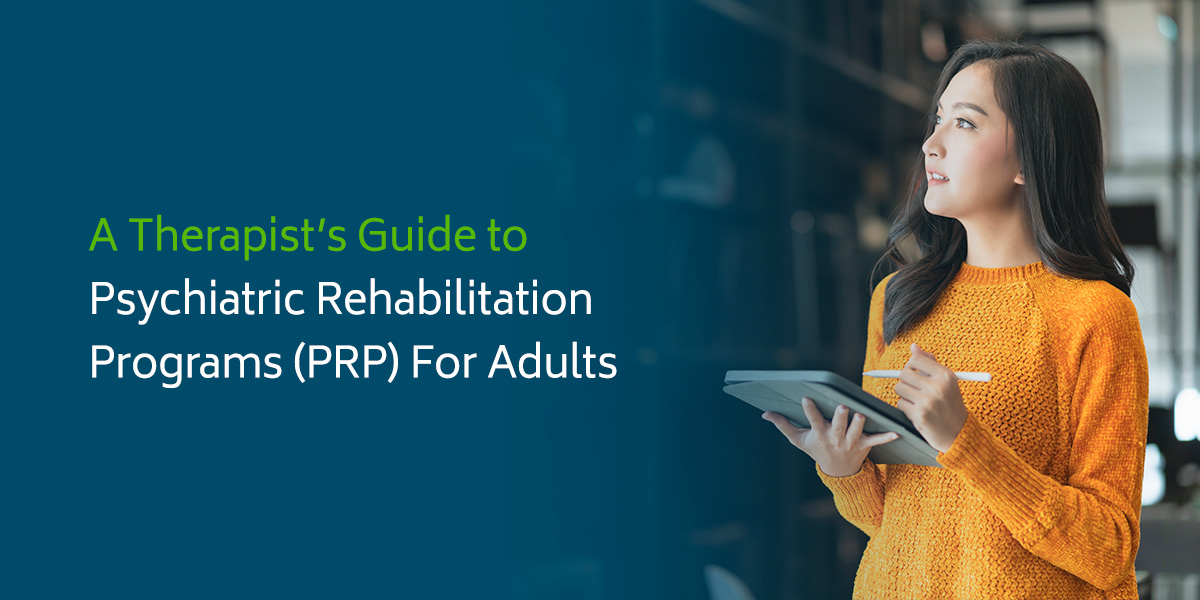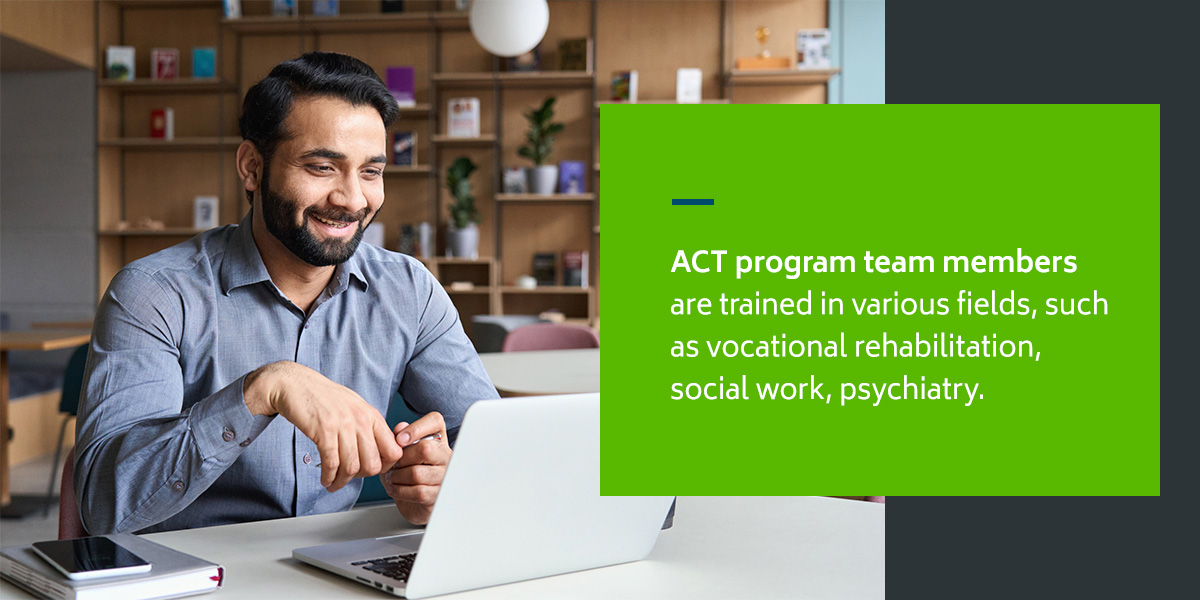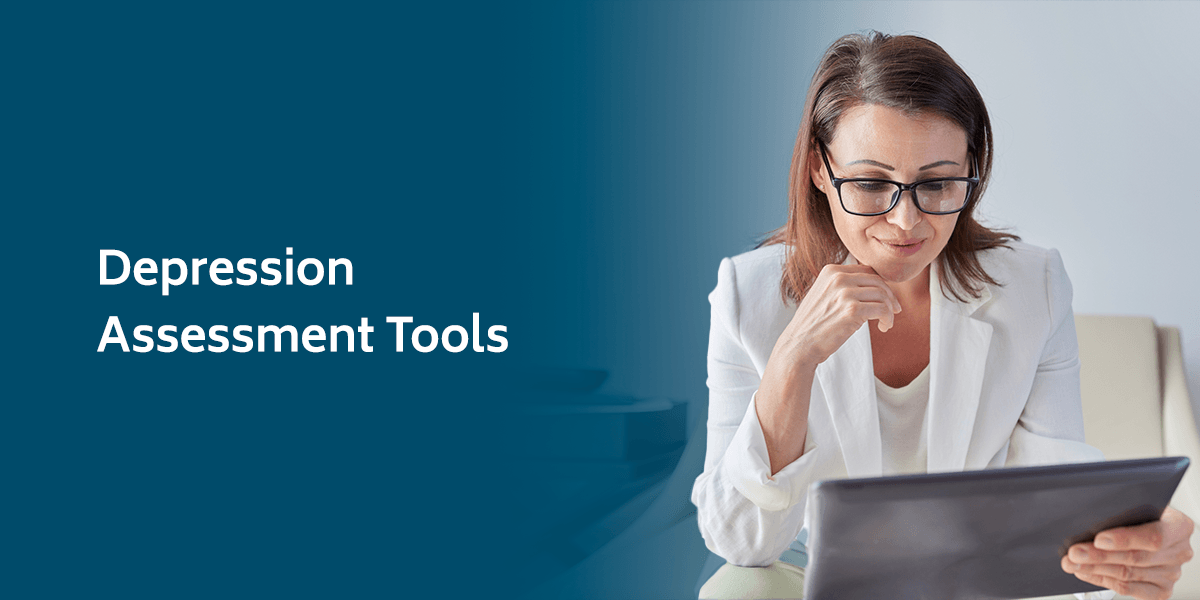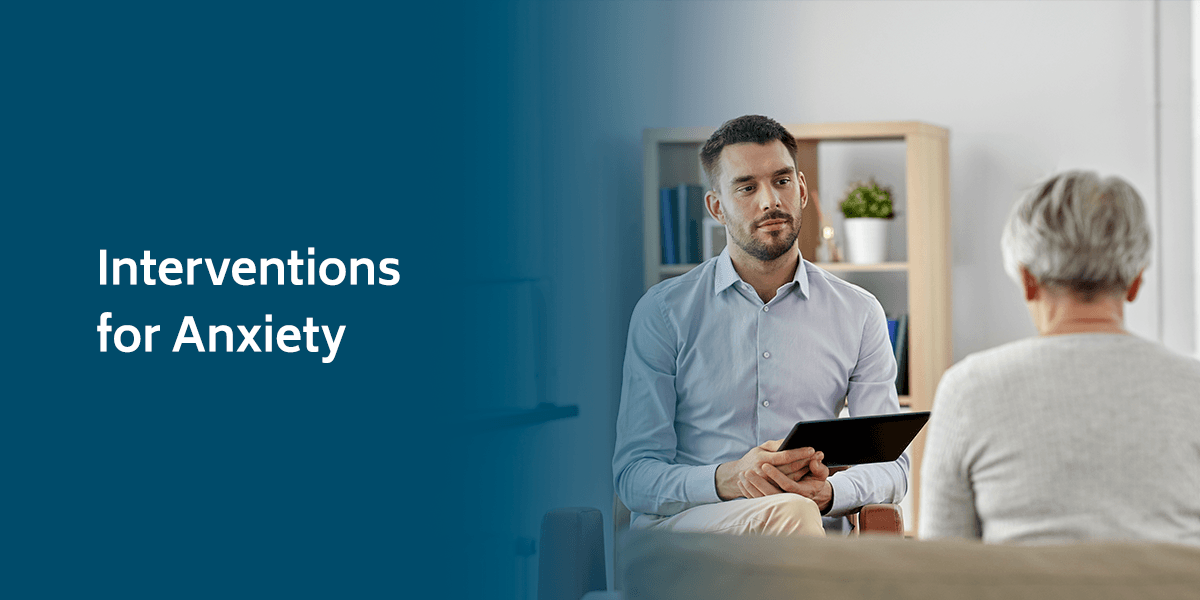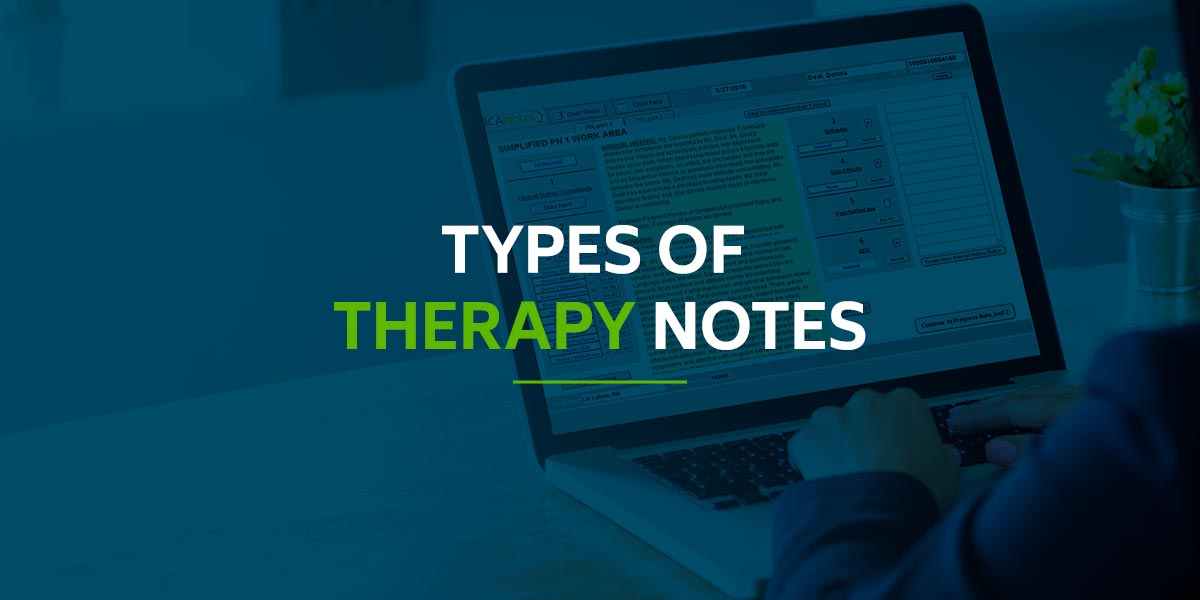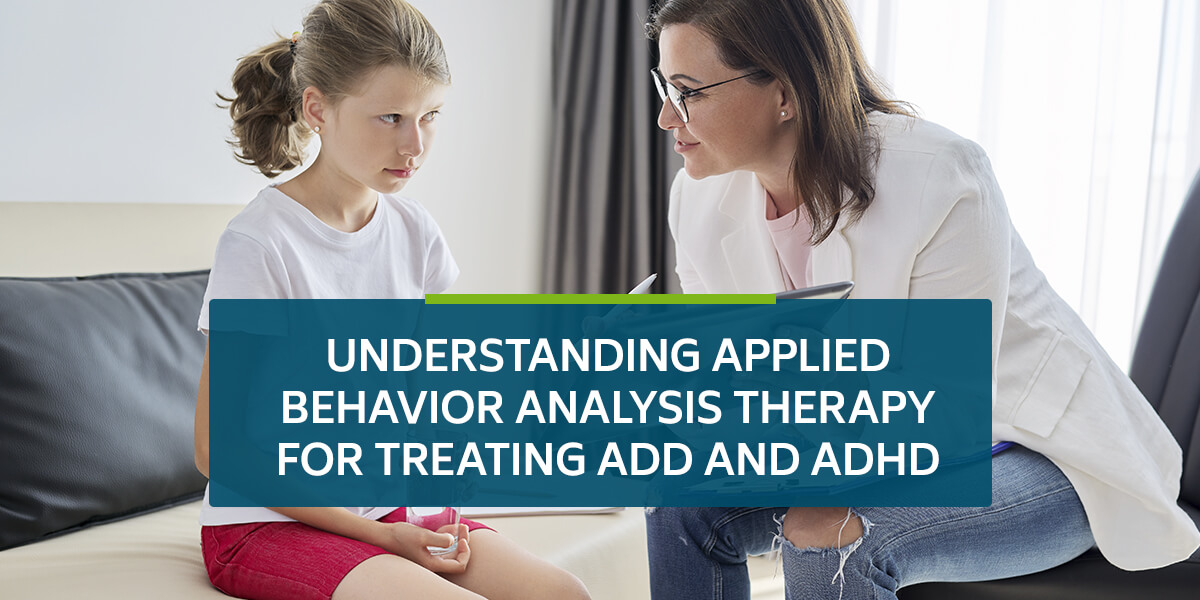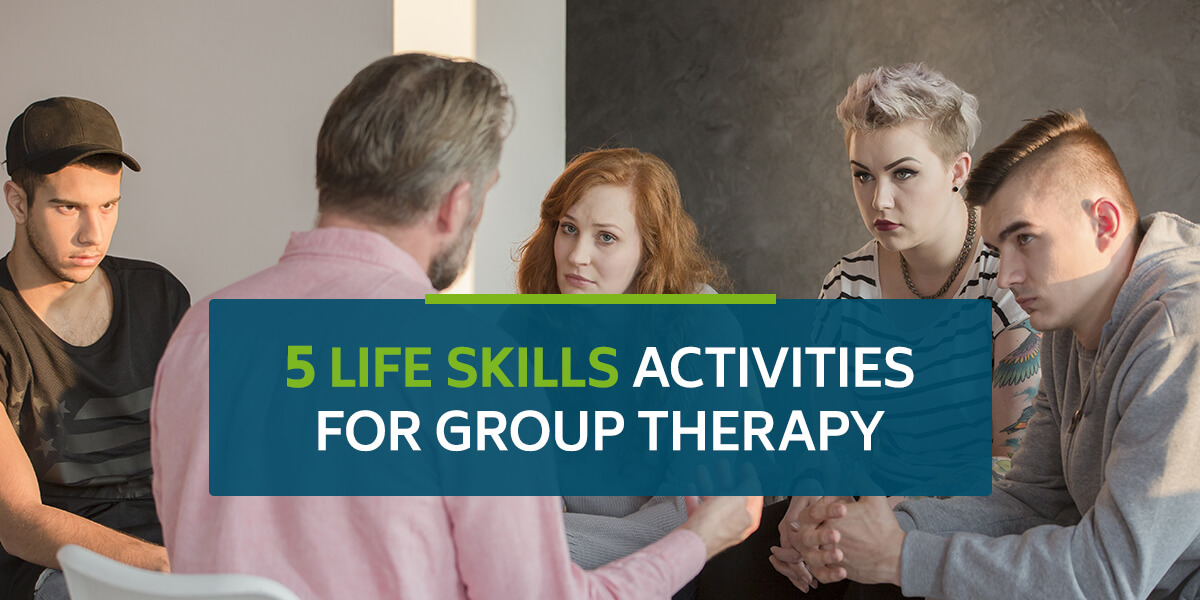A Therapist’s Guide to Psychiatric Rehabilitation Programs (PRP) For Adults
In 2020, over 14 million adults had serious mental illnesses (SMI) in the United States, and only about 65% of those adults received mental health services. These serious mental illnesses are determined by disorders resulting in severe functional impairment that limits or burdens major life activities.
Some examples of serious mental illnesses can include various types of schizophrenia, bipolar disorder, major depression and other overlapping mental illnesses. Over the years, therapeutic and psychiatric services have evolved to accommodate and provide support and independence for individuals living with mental illnesses. These services and programs are often designed for those that have trouble keeping a job, socially interacting with others or maintaining personal and household activities.
Understanding psychiatric rehabilitation programs is key to supporting patients with SMI. Let's explore what these programs look like and how they can help your patients reach their treatment goals.
Table of Contents
- What Is a Psychiatric Rehabilitation Program?
- Principles of Psychiatric Rehabilitation
- Types of Psychiatric Rehabilitation Program Models
- How to Track the Psychiatric Rehabilitation Process
- PRP Note Writing With ICANotes
What Is a Psychiatric Rehabilitation Program?
Psychiatric rehabilitation programs (PRPs) involve a wide range of services, treatment and support for patients with SMI. Many different professionals deliver these services, such as psychiatrists, therapists and social workers. Other people in the patient's life, such as family members and friends, are often involved, too. All of these individuals help patients improve their quality of life and health outcomes and successfully integrate with social and community resources.
PRPs often focus on helping the patient perform in a specific role, such as a student, parent or worker. Like other kinds of rehabilitation, two key elements of PCP are developing skills and modifying the patient's environment to maximize independence and restore optimal functioning. This process involves identifying the patient's skills, abilities and strengths and what limitations their illness has created. Mental health professionals work with the patient to determine what supports are needed and how they can help the patient reach them.
Some patients who might be referred to a PRP include those who:
- Have had some success during treatment but still experience affected functioning.
- Have a severe form of mental illness that causes disability.
- Don't receive adequate opportunities in their environments to support optimal functioning.
- Can function independently but lack motivation or give up due to stigma or circumstances.
PRPs might include residential programs, in which the patient stays overnight long-term, or day programs, in which the patient visits during the day for treatment and returns home at night. Deinstitutionalization was a significant movement in the psychiatric field, and, although residential stays may still be necessary, modern PRPs aim to deliver respectful housing options and support systems that retain dignity and choice. These programs also consider compounding or complicating issues like substance use and comorbid diagnoses.
Psychiatric rehabilitation programs benefit patients with diverse diagnoses and can be individualized to fit unique goals and needs. A PRP is usually more involved than standard outpatient care, providing more intensive resources and environmental changes to help patients meet their goals.
Principles of Psychiatric Rehabilitation
The principles of psychiatric rehabilitation help providers deliver successful treatment. The Psychiatric Rehabilitation Association (PRA) Code of Ethics provides these principles, guidelines and values, which serve as a guide of conduct for providers and practitioners.
These principles vary in definition and are not ranked in any specific order but are fundamental to the psychiatric rehabilitation field and profession. According to the 12 guidelines based on principles set by the PRA, psychiatric rehabilitation practitioners and practices should:
- Display respect, hope and the belief that all individuals can learn and grow, regardless of their background.
- Recognize that an individual's culture plays a vital role in their recovery and aim to provide culturally relevant services.
- Create partnerships with the family, friends or support system of the individual receiving services by keeping them informed and allowing them to share in decision-making processes.
- Focus on the individual's unique strengths and build on those abilities.
- Design and implement plans to address the individual's specific needs, hopes, aspirations and values through person-centered care.
- Support individuals in their recovery to integrate with their communities, maintaining the individual's rights of citizenship and assisting them in accepting responsibilities and discovering new opportunities as valuable members of society.
- Promote and support an individual's empowerment and self-determination, emphasizing the right of all people to make their own decisions, especially about the services and treatment they receive.
- Help develop personal support systems and networks, such as peer support, individual therapy and group therapy, within an individual's community.
- Aim to help individuals improve their quality of life in all aspects, such as social, educational, financial, occupational and other areas that affect an individual's fulfillment.
- Encourage the health and wellness of every individual, ensuring they identify objectives and create unique wellness plans.
- Utilize and continuously evaluate the best evidence-based health care practices for every individual to successfully produce outcomes that align with the individual's recovery goals and intentions.
- Make services available and accessible to any individual in need, regardless of mental illness or psychiatric circumstances, with a sufficient level of coordination and support for other psychiatric, medical and holistic practices and treatments.
These principles and values are fundamental for practitioners to find the appropriate psychiatric rehabilitation program for individuals and support their progress to meeting their goals and outcomes.
Types of Psychiatric Rehabilitation Program Models
PRP models can vary depending on the patient's diagnosis, the severity of symptoms, willingness to participate and several other factors. The Psychiatric Rehabilitation Model points out that a mental health system must address the person's impairment or symptoms, but also their ability to perform tasks and roles and deal with discrimination and poverty. The model provides a framework to help practitioners determine the appropriate treatment and rehabilitation for each patient and their stage of SMI:
- Impairment: Mental illness that presents a loss or abnormality of psychological or physiological function or anatomical structure is identified as impairment. This can be displayed in various forms, such as hallucinations, delusions or depression.
- Dysfunction: An individual with mental illness at this stage lacks the ability or restrictions to perform typical tasks or activities that are considered normal. This could include a lack of social and work adjustment skills or activities of daily living (ADL) skills.
- Disability: Mental illness at this stage can result in restrictions or lack of ability to perform a role considered normal for a human being, displayed in the form of unemployment or homelessness.
- Disadvantage: Severe mental illness in this stage presents a lack of opportunity for the individual that limits or prevents them from doing an activity or fulfilling a normal role based on their age, sex and cultural and social factors. These disadvantages can include discrimination and poverty.
Psychiatric rehabilitation values the needs of patients in these stages as well as their involvement, choice, strengths, growth potential and provider outcome accountability during treatment and training. There are a variety of mental health treatment settings and levels of care depending on the rehabilitation model and individuals' circumstances.
The following are different types of general licensed psychiatric rehabilitation program models that an individual might benefit from:
- Outpatient programs: These programs are defined as treatment involving no overnight stays at a facility or clinic, such as day treatment. These programs can be located in mental health centers, general hospitals or private practices. Individuals in outpatient settings can receive services from various mental health providers, such as individual and group therapy or medication management.
- Inpatient or hospitalization programs: These programs involve overnight or longer stays for severely ill mental health patients who need around-the-clock care. Usually, the inpatient stays last about 30 days. Then, the individual will be transferred to another psychiatric facility or residential program.
- Housing or residential programs:These programs are a type of inpatient service that helps patients whose mental illness has drastically impaired their ability to function. Housing programs provide patients with a sense of independence while learning basic daily activities and strengthening their social skills. Residential programs often provide long-term treatment and medical care but are designed to be more comfortable than the typical hospital setting.
More specifically, patients can receive treatment and achieve outcomes from various organizational program structures that fall within the previous three categories, including:
ACT Programs
Assertive Community Treatment, or ACT programs, use a comprehensive and local-based treatment model for individuals with serious mental illness. It is one of the most widely researched evidence-based practices for SMI treatment. These programs work on a service-delivery model that provides individualized treatment in a person's home. This way, the individual can benefit from around-the-clock treatment, care and services that they would receive in a psychiatric unit but be more comfortable in their own home.
ACT program team members are trained in various fields, such as vocational rehabilitation, social work, psychiatry and other treatment services to ensure every patient receives ongoing support to help alleviate their symptoms. ACT programs are also a great way for patients to feel a sense of independence while treating their mental illness.
The primary goals of ACT are to reduce or eliminate the debilitating symptoms of mental illness that prevent an individual from meeting basic needs. This program also aids in lessening the burden on an individual's family to provide care while helping them improve in social and employment roles.
Some of the key features of ACT programs include:
- Behavioral skill teaching.
- Collaboration with families.
- Group therapy.
- Medication.
- Support for employment, housing, money-managing and education.
Clubhouse Programs
The Clubhouse model combines an intentional therapeutic community with the support and promotion of employment, education, housing and health and wellness. This program is often a cheaper alternative to a psychiatric stay in a hospital setting. It allows individuals who have mental illnesses to live in an environment of shared work and purpose. Clubhouses emphasize the sense of community, membership and belonging as means to recovery.
According to Clubhouse International, these programs are associated with improved employment rates, low-cost care, significant reductions in hospitalizations, fewer incarcerations, improved well-being and better physical and mental health.
While members are staying in a Clubhouse, they will have access to many different opportunities that enable them to successfully rejoin societal support. In contrast to ACT programs, Clubhouse programs bring individuals together to live in a healthy, restorative environment to rely on others who are also in the process of recovery. For many people whose lives have been severely disrupted due to their mental illness, living and engaging with others who are going through the same thing can make them feel less isolated.
Clubhouse programs may also help individuals feel hope in treating their mental illness and increase their confidence and participation during rehabilitation. Clubhouses are usually voluntary and self-determined, so individuals can stay and receive treatment and health care services in their chosen timeline.
IPS Programs
Individual Placement and Support (IPS) Programs are rehabilitation interventions for those with debilitating mental illnesses. This program focuses on supported employment so those with severe behavioral health conditions can work jobs of their choosing.
Two-thirds of people with SMI want to work, yet just 15% are employed, and IPS can significantly improve competitive employment rates, with individuals using IPS services being 2.4 times more likely to be employed than controls. They also attain employment faster, hold work more hours and hold jobs for longer. Using various forms of education and technical training in IPS, individuals can learn skills that help advance their career paths.
When individuals with severe mental illness are also unemployed, it may add to their feelings of low self-esteem and alienation. These strong feelings may sometimes lead to increased symptoms of their disorders, making it even more challenging to access and accept help. IPS programs emphasize the benefits of employment for those with mental health illnesses, such as:
- Improved self-esteem.
- Enhanced quality of life and social skills.
- Reduced substance misuse and hospitalization.
IPS programs are also another cost-effective treatment option that offers services to all individuals regardless of their diagnosis, symptoms or prior psychiatric hospitalizations.
The psychiatric rehabilitation process can be implemented in any of these program models in any setting. The importance of these programs is not necessarily the setting of the treatment as much as helping the individual become successful in recovery and feel fulfilled in living, working and thriving in social environments. These programs vary from state to state depending on different codes, rules and regulations for psychiatric rehabilitation services.
How to Track the Psychiatric Rehabilitation Process
The most crucial part of the psychiatric rehabilitation process is note-writing. It allows mental and behavioral health professionals to track a patient's recovery through proper documentation of an individual's symptoms, diagnosis, behaviors and progress. The major steps of any mental health rehabilitation program or service can help identify and measure how close a patient is to their intended outcome and what interventions may be appropriate to support these goals.
The service delivery process varies for each individual but typically includes the following steps:
- Treatment
- Crisis intervention
- Case management
- Rehabilitation
- Enrichment
- Rights protection
- Basic support
- Self-help
- Wellness and prevention
The Diagnostic-Planning-Intervention (DPI) Process of Psychiatric Rehabilitation helps mental health providers keep track of these processes by segmenting them into three main phases:
- Diagnosing phase: This phase determines an individual's readiness for rehabilitation. The practitioner will help the individual set goals and evaluate their strengths and skills in relation to their goals. This phase will also involve functional and resource assessments, which are important tools in the rehabilitation process.
- Planning phase: This phase involves planning for resource and skills development to help reduce symptoms. A practitioner will also develop supports and high-priority objectives for the overall rehabilitation goals and set specific interventions for each one.
- Intervention phase: In this phase, the rehabilitation plan is finally implemented to help achieve the set goals by changing the individual or their environment with the growth of their skills and supports. The intervention phase involves direct skills teaching and utilization as well as resource coordination and modification.
Tracking patient progress through documentation is vital for psychiatric rehabilitation processes. It helps the provider understand progress and evolving patient needs, and it is especially useful in team-based care. Many PRP settings involve multiple providers, so thorough documentation ensures that all practitioners are up-to-date on the patient's progress and care plan. Lastly, it also helps practices stay compliant with legal requirements.
The right note-taking solution can help mental health professionals determine the level of documentation specificity needed according to the individual's needs.
PRP Note Writing With ICANotes
With proper documentation through ICANotes, you can efficiently record, track and update your patient's progress. ICANotes is the premier electronic health record for the behavioral health specialty, working with inpatient and outpatient settings to help bring you the most clinically robust and intuitive charting solution.
Our fully templated software allows you to document notes in a fraction of the time, access progress notes, create comprehensive initial assessments and develop treatment plans for a variety of services. With ICANotes, you can also share your patient's behavioral health chart with external medical and mental health professionals for simultaneous treatment. Maintaining thorough documentation is important, and it has never been easier with our software solution that offers plenty of efficient features to fit your patient's unique needs.
Start your free trial today or request a live demo online to see how we can reduce your documentation time.
Sources
- https://www.nimh.nih.gov/health/statistics/mental-illness
- https://mentalillnesspolicy.org/serious-mental-illness-not/
- https://www.frontiersin.org/articles/10.3389/fnins.2019.00108/full
- https://health.maryland.gov/bha/Pages/psychiatric-rehabilitation-program.aspx
- https://www.psychrehabassociation.org/sites/default/files/series-documents/2018_code_of_ethics.pdf
- https://www.psychrehabassociation.org/about/core-principles-and-values
- https://www.psychrehabassociation.org/sites/default/files/series-documents/2018_code_of_ethics.pdf#page=2
- https://cpr.bu.edu/wp-content/uploads/2013/12/prprimer.pdf
- https://case.edu/socialwork/centerforebp/practices/assertive-community-treatment
- https://namimn.org/wp-content/uploads/sites/188/2018/05/Assertive-Community-Treatment_TreatmentOptions_2018.pdf
- https://clubhouse-intl.org/what-we-do/what-clubhouses-do/
- https://soarworks.samhsa.gov/article/ips-supported-employment
- https://cpr.bu.edu/wp-content/uploads/2013/12/prprimer.pdf#page=17
- https://www.researchgate.net/publication/348187393_ASSESSMENT_TOOLS_IN_PSYCHIATRIC_REHABILITATION
Last updated on October 12, 2022

